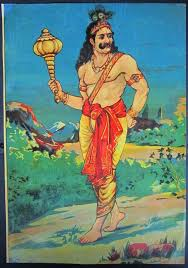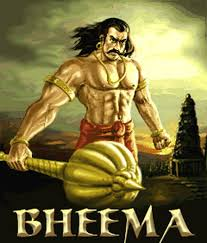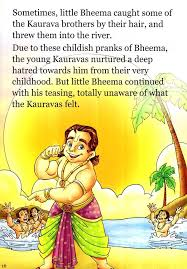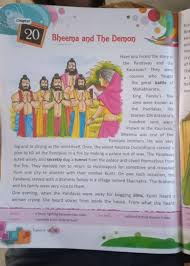Bheema story
“Bheema,” also spelled “Bhima,” is one of the central characters in the Indian epic, the Mahabharata. He is known for his immense physical strength, loyalty, and bravery. Bhima, the second of the five Pandava brothers, plays a crucial role throughout the narrative, contributing significantly to their successes and the ultimate victory in the Kurukshetra war.
Table of Contents
Early Life and Birth
He was also known for his straightforwardness and impatience, traits that sometimes put him at odds with his cousins, the Kauravas, especially Duryodhana.
Bhima’s Strength and Feats
Bhima’s extraordinary strength is a recurring theme in the Mahabharata. From a young age, he demonstrated his power by performing incredible feats of strength. He once killed a giant demon named Hidimba, who had terrorized the region. After defeating Hidimba, Bhima married his sister, Hidimbi, and they had a son named Ghatotkacha, who would later play a crucial role in the Kurukshetra war.

Bhima’s strength was not just physical but also symbolized his moral fortitude and unyielding spirit. He was a constant source of support and protection for his brothers, often standing up to injustices and fighting for their rightful place.
The Rivalry with Duryodhana
Bhima’s rivalry with Duryodhana, the eldest of the Kauravas, is one of the central conflicts in the Mahabharata. This animosity began in their childhood and intensified over the years. Duryodhana, feeling threatened by Bhima’s strength and the rightful claim of the Pandavas to the throne, often plotted against them.

One of the most significant incidents was the poisoning and attempted drowning of Bhima by Duryodhana and his brothers. However, Bhima survived this attempt on his life due to his divine heritage and the intervention of the Nagas (serpent people). This event only deepened Bhima’s resolve to stand against Duryodhana and his evil plans.
The Exile and Draupadi
Bhima’s life took a significant turn when he and his brothers married Draupadi, the princess of Panchala. Draupadi’s humiliation in the Kaurava court, where Duryodhana and his brothers attempted to disrobe her, left an indelible mark on Bhima. He vowed to avenge this dishonor, promising to kill Duryodhana and his brothers.

During the Pandavas’ exile, Bhima played a crucial role in protecting his family. He defeated several demons and hostile forces, ensuring their safety and well-being. One notable incident was his encounter with Hanuman, his spiritual brother, who blessed him and enhanced his strength.
Bhima in the Kurukshetra War
The Kurukshetra war is the climax of the Mahabharata, and Bhima’s role in it is pivotal. His strength and combat skills made him one of the most formidable warriors on the battlefield. Bhima’s primary objective was to fulfill his vow of avenging Draupadi’s humiliation.

Bhima’s most significant contribution to the war was his duel with Duryodhana. In a fierce battle, Bhima struck a fatal blow to Duryodhana’s thigh, fulfilling his vow and crippling his arch-enemy. This act, though controversial and criticized by some as against the rules of combat, was seen as a necessary and just action by others.
Bhima’s Character and Legacy
Bhima is often portrayed as a man of immense physical strength but also as someone with deep emotional and moral strength. His unwavering loyalty to his family, his sense of justice, and his courage in the face of adversity are defining traits. Bhima’s character embodies the virtues of a warrior and the principles of dharma (righteousness).
His relationship with his brothers, particularly Yudhishthira and Arjuna, is one of mutual respect and love. Bhima’s protective nature and his willingness to sacrifice for the greater good highlight his selflessness and dedication.

Bhima’s legacy extends beyond his physical prowess. He is a symbol of resilience, standing up against oppression, and fighting for justice. His life and actions continue to inspire stories and moral lessons in Indian culture and beyond.
Conclusion
Bhima’s role in the Mahabharata is multifaceted, encompassing his strength, bravery, loyalty, and sense of justice. As a central figure in one of the greatest epics of all time, Bhima’s story is not just about his physical might but also about his unwavering spirit and commitment to righteousness. His character serves as a reminder of the power of inner strength and the importance of standing up for what is right, even in the face of overveiw.









